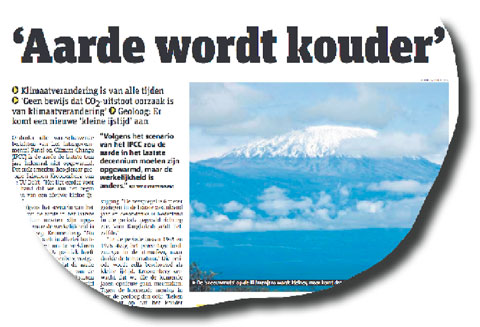Not everybody believes in global warming by human causes. Last Monday, the free newspaper Metro ran the headline: ‘The earth is getting colder’. Professor Salomon Kroonenberg, a geologist at TU Delft, stated in this article that we might even be heading towards a small Ice Age.
“I’m not necessarily saying that there will be a small Ice Age – just that there is still a lot about the climate we don’t properly understand,” Professor Salomon Kroonenberg states. “Take a look at the past fifty years: carbon dioxide has been on the rise throughout this whole period, but the temperature hasn’t. During about half of that period, the temperature actually dropped. And it has been doing so since 1998. This indicates that carbon dioxide isn’t the sole driving force behind the climate. The IPCC [Intergovernmental Panel on Climate Change ed.] couldn’t predict this temperature decline, so why should they be correct in predicting future warming?”
Kroonenberg believes we should focus more on other possible climate influences, like solar activity. The activity of the sun can be determined by counting its sunspots. These sunspots show up as dark areas on the sun’s surface and are caused by large eruptions of energy. Thus, the more sunspots that are visible, the higher the sun’s activity. “There was a small Ice Age, in which the world was colder than average, between approximately the 15th and 19th centuries, and most notably in the 17th century,” Kroonenberg explains. “This period happens to coincide with a period in which there were very little sunspots. For the past few years there have also hardly been any sunspots. Their number should have been on the rise again, because of the cyclic nature of the sun’s activity, but we still don’t see them. We don’t seem to understand the cycles of the sun yet. This is why I said we might well be heading for another small Ice Age.”
Still, Kroonenberg isn’t wholly opposed to the Copenhagen conference: “One of the main goals of the Kyoto Protocol and this new protocol is energy reduction. And I think this is very necessary indeed, simply because we are running out of fossil fuels. I just think that it’s wrong to emphasize a connection between saving energy and the climate. What if the climate doesn’t change as much as predicted? People might then think that all these energy-saving measures aren’t really necessary. But they are. Also, at the moment, they are broadly discussing two types of measures to prevent climate change: some save energy, but some cost energy. I don’t mind if measures that focus on saving energy might, as a side effect, help prevent climate change. But what about measures like pumping carbon dioxide underground? That both costs a lot of money and a lot of energy, even though we don’t know if it will be effective.”
Een elektrische auto levert, op basis van de bestaande elektriciteitscentrales, veertig procent minder broeikasgassen dan een auto met verbrandingsmotor. Alle verkeer en vervoer samen staan voor ongeveer 20 procent van de nationale emissies, zodat elektrificering van het wegvervoer de nationale uitstoot met ongeveer 10 procent zou kunnen verminderen. Naarmate de stroomvoorziening duurzamer wordt, daalt de CO2-emissie nog verder.
Eind februari stelde minister Eurlings (verkeer en waterstaat) tien miljoen euro beschikbaar voor grote demonstratieprojecten van elektrisch vervoer in de grote steden. En vrijdag komen alle partijen die zich in Nederland met elektrisch vervoer bezighouden naar Delft om een gezamenlijk onderzoeksprogramma op te stellen.
Naast de drie TU’s zijn er ondermeer de Hogeschool Rotterdam en Hogeschool Arnhem Nijmegen, onderzoeksinstelling ECN, Stichting Natuur en Milieu, Econcern, ANWB, Athlon Car Lease en oplaadexpert Epyon. In totaal zijn vijftien partijen vertegenwoordigd in wat bekend staat als D-incert (Dutch Innovation Centre for the Electrification of Road Transport).
Aan belangstelling voor de proeftuinen, waarvoor Eurlings tien miljoen ter beschikking heeft gesteld, is geen gebrek. Rotterdam wil graag een demo met elektrische voertuigen en oplaadpunten (van Eneco) in de stad. In Den Bosch wil energiebedrijf Enexis (voorheen Essent) de eigen servicevloot elektrisch laten rijden. Ook Schiphol zou graag zien dat auto’s op eigen terrein elektrisch worden aangedreven. Amsterdam is bezig met een project om taxi’s te elektrificeren in het kader van de luchtkwaliteit van de binnenstad en ook in Leeuwarden staan binnenkort elektrische taxi’s voor het station.
De knelpunten voor elektrisch vervoer zijn volgens dr.ir. Stephan van Dijk (programmamanager D-incert) de beperkte batterijcapaciteit, verkorting van de oplaadtijd, recyclingprogramma voor batterijen en – niet in het minst – de verleiding van de consument.
Een elektrische auto is door het accupakket van tussen twintig- en dertigduizend euro namelijk een stuk duurder dan een conventionele wagen. De klant moet begrijpen dat hij dat op den duur, en misschien ook wel door speciale belastingmaatregelen, terug verdient.
Op de TU werken volgens D-incert vijfhonderd mensen aan duurzame energie, verspreid over alle faculteiten. Ongeveer vijfentwintig tot veertig van hen werken aan elektrisch vervoer. Bij Industrieel Ontwerpen werkt prof.dr. Cees de Bont aan de vormgeving van de elektro-auto c’mm’n. Prof.dr. Bram Ferreira leidt op Elektrotechniek Wiskunde en Informatica onderzoek naar infrastructuur voor het opladen van accu’s.
Bij Techniek, Bestuur en Management werken de groepen van prof.dr.ir. Margot Weijnen en dr.ir. Paulien Herder aan het ontwerp en de besturing van zogenaamde Smartgrids. Prof.dr.ir Fokko Mulder (Technische Natuurwetenschappen) werkt aan verbetering van Li-ion batterijen. Ook bij Werktuigbouwkunde, Maritieme Techniek & Technische Materiaalwetenschappen, Luchtvaart en Ruimtevaarttechniek en Civiele Techniek en Geowetenschappen vindt gerelateerd onderzoek plaats.



Comments are closed.